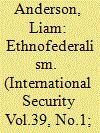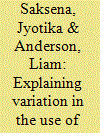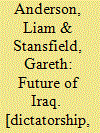|
|
|
Sort Order |
|
|
|
Items / Page
|
|
|
|
|
|
|
| Srl | Item |
| 1 |
ID:
134091


|
|
|
|
|
| Publication |
2014.
|
| Summary/Abstract |
Scholars are divided on the merits of ethnofederalism as an institutional approach to the management of ethnically divided societies. For some, ethnofederalism is a potentially workable compromise between the demands for independence of territorially concentrated ethnic groups and the desire of a common state to preserve its territorial integrity; for critics, it is a short-cut to secession and ultimate state collapse. The argument of critics is theoretically plausible, but an examination of the universe of post-1945 states with ethnofederal arrangements, both failures and successes, shows that ethnofederalism has succeeded more often than it has failed. Within this universe of cases, moreover, ethnofederalism has demonstrably outperformed institutional alternatives, and where ethnofederal systems have failed, they have failed where no institutional alternatives could plausibly have succeeded. The increasing enthusiasm among policymakers and practitioners for prescribing federal solutions to ethnic problems is both understandable and defensible in light of these findings.
|
|
|
|
|
|
|
|
|
|
|
|
|
|
|
|
| 2 |
ID:
082349


|
|
|
|
|
| Publication |
2008.
|
| Summary/Abstract |
Despite the much-touted celebration of the successes of the General Agreement on Tariffs and Trade/World Trade Organization in liberalizing free trade, these successes have been limited due to the increasing use of non-tariff barriers (NTBs) as a form of 'protectionism in disguise.' Among advanced industrial economies, the use of NTBs varies considerably. The purpose of this paper is to explain what accounts for this variation. We locate the issue of international trade in its appropriate theoretical context - as a two-level game in which politicians simultaneously face pressure at the international level to fulfill commitments to international free trade agreements, and domestic pressures for protectionist relief. We conduct a statistical analysis using a simple, multivariate regression model examining data at three points in time, 1988, 1993, and1996, to highlight the causes of the rise in NTBs and variation in their usage. We hypothesize that PR-based systems are associated with lower rather than higher levels of NTBs
|
|
|
|
|
|
|
|
|
|
|
|
|
|
|
|
| 3 |
ID:
067083


|
|
|
|
|
| Publication |
Hampshire, Palgrave Macmillan, 2004.
|
| Description |
ix, 278p.pbk
|
| Standard Number |
1403971447
|
|
|
|
|
|
|
|
|
|
|
|
Copies: C:1/I:0,R:0,Q:0
Circulation
| Accession# | Call# | Current Location | Status | Policy | Location |
| 050446 | 956.70443/AND 050446 | Main | On Shelf | General | |
|
|
|
|
| 4 |
ID:
087382


|
|
|
|
|
|
|
|